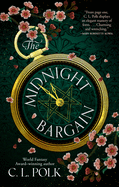
In The Midnight Bargain, C.L. Polk (Witchmark) uses the imagined world of Chasland (a land "long on wealth and short on social progress") and classic tropes of many Regency romance novels to deliver a timely message about social and gender justice. Beatrice Clayborn is the powerful eldest daughter of a noble family whose coffers have run dry. Her magic runs deep and strong, though it is valuable to her family only insofar as it can secure her a wealthy husband and produce for him magical heirs. Beatrice longs for something more than marriage to a man of her father's choosing, and has identified a powerful grimoire that can help her build the world she wants. Her pursuit of the book leads her to an unexpected friendship with another sorceress--and a burgeoning love for her new friend's brother.
Over the course of The Midnight Bargain, Beatrice comes into her power--of both the magical and metaphorical varieties--forcing those around her to face uncomfortable truths about the status quo, who it benefits and at what cost. "The current system lays all of the restriction, all the responsibility, and all of the burden on sorceresses," she explains. "For [men], the system isn't broken, so why look for a solution?" This struggle to find a resolution that lessens the patriarchal burden placed on women's shoulders feels as relevant in the real world as it does in Polk's expertly imagined one. The Midnight Bargain is a feminist fantasy novel that is both charming and important, further cementing Polk's place as a powerful voice in the genre whose work exposes the broken systems in the real world. --Kerry McHugh, blogger at Entomology of a Bookworm

